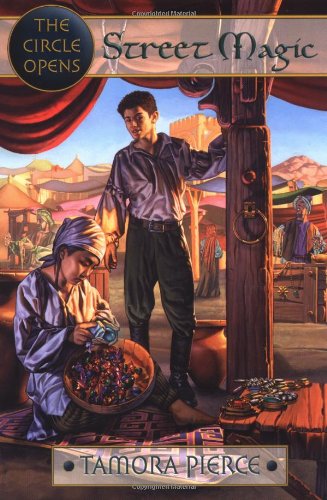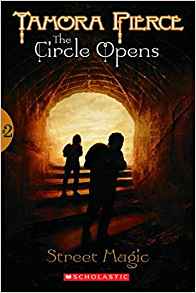-
Main Street
Sinclair Lewis
eBookThis book was converted from its physical edition to the digital format by a community of volunteers. You may find it for free on the web. Purchase of the Kindle edition includes wireless delivery.
-
Street Magic
Tamora Pierce
Mass Market Paperback (Scholastic Paperbacks, April 1, 2002)Part of the 8-book Tamora Pierce reissue for Fall 2006, this title in the Circle Opens quartet features spellbinding new cover art. Coincides with the release of WILL OF THE EMPRESS in trade pb.Briar Moss been training four years as a plant mage, but he hasn't put his past behind him. He meets a street girl, Evvy, using powerful magic to polish stones for a merchant, and resolves to find her a teacher. But Briar understands the city's gangs as well as he understands Evvy. When gang warfare breaks out, he discovers that the fiercest gang is seeking a stone mage to lead them to hidden gems. Only Briar and his magic can offer Evvy protection. Swept up in a bloody conflict, Briar must decide if he's ready to make the final step away from his former life as a "street rat". W
W
-
Main Street
Sinclair Lewis, Kitty Hendrix, Post Hypnotic Press Inc.
Audible Audiobook (Post Hypnotic Press Inc., Oct. 31, 2019)This 100th Anniversary Edition includes: A new Foreword by biographer Richard Lingeman A new Afterword to the Audiobook by Dr. Sally Parry. Published on October 23, 1920, Main Street was the first of Sinclair Lewis's great successes. According to biographer Mark Schorer, it "was the most sensational event in 20th-century American publishing history, from the point of view both of sales and of public response. The printers could not keep up with the orders, and for a while the publishers had to ration out copies to book-sellers." A biting satire that countered the American myth of wholesome small-town life with a depiction of narrow-minded provincialism, it was to some degree based on Lewis's own experience of growing on Sauk Centre, Minnesota. Set in mid-1910s, it depicts the struggles of Carol Kennicott, a city girl, as she tries to adapt to small town life, having left her librarian job and St. Paul, Minnesota to marry Dr. Will Kennicott of Gopher Prairie. Dismayed by the town's drabness and the conforming, petty inhabitants, Carol optimistically sets out to improve the town, only to find her ideas met with distrust and derision, and herself becoming a pariah. Lewis was in the vanguard of a generation of American writers seeking realism to their work (Ernest Hemingway. F. Scott Fitzgerald, Willa Cather, Theodore Dreiser...). Lewis's intimate knowledge of small-town America and subtle characterizations make Main Street a compelling classic still surprisingly relevant today: the religious bigotry, racism, puritanical righteousness, and duplicitous business practices Lewis exposes are with us still. His portrayal of women, especially Carol, is surprisingly sensitive, and his depiction of marriage and the compromises expected of woman offer both insightful social commentary and convincing realism. The Pulitzer Committee recommended Lewis for the Pulitzer for Main Street in 1921, but the Trustees of Colombia University overruled the jury. In 1923, Lewis's "Babbitt" was chosen, but again the committee was overruled by the Trustees. He was finally awarded the Pulitzer in 1926 for "Arrowsmith", but he turned it down - becoming the first writer to do so. In 1930, he became the first American to be awarded the Nobel Prize for Literature. The committee, wrote: Main Street exemplifies Lewis' "vigorous and graphic art of description and his ability to create, with wit and humour, new types of characters."
-
Main Street
Sinclair Lewis, Lloyd James, Tantor Audio
Audiobook (Tantor Audio, Dec. 28, 2010)This famous satire of life on Main Street, Gopher Prairie, mirrors with devastating honesty life on Main Streets from Albany to San Diego.
-
Main Street
Sinclair Lewis
eBook (Digireads.com, March 30, 2004)"Main Street" is the 1920 novel by Sinclair Lewis that tells the story of Carol Milford, a liberal, free-spirited young woman from Minneapolis, Minnesota. Carol meets and marries Will Kennicott, a doctor who convinces her to move back to his small hometown of Gopher Prairie, Minnesota. While there, Carol finds the smug conservatism of the town objectionable and sets out to try and make the town a little more progressive, with little effectiveness. A satirical gem, "Main Street" is Sinclair Lewis' classic portrait of small town midwestern American life.
-
Main Street
Sinclair Lewis
eBook (Digireads.com, March 30, 2004)"Main Street" is the 1920 novel by Sinclair Lewis that tells the story of Carol Milford, a liberal, free-spirited young woman from Minneapolis, Minnesota. Carol meets and marries Will Kennicott, a doctor who convinces her to move back to his small hometown of Gopher Prairie, Minnesota. While there, Carol finds the smug conservatism of the town objectionable and sets out to try and make the town a little more progressive, with little effectiveness. A satirical gem, "Main Street" is Sinclair Lewis' classic portrait of small town midwestern American life.
-
Main Street
Sinclair Lewis, George Killough
Mass Market Paperback (Signet, June 3, 2008)The first of Sinclair Lewis’s great successes, Main Street shattered the sentimental American myth of happy small-town life with its satire of narrow-minded provincialism. Reflecting his own unhappy childhood in Sauk Centre, Minnesota, Lewis’s sixth novel attacked the conformity and dullness he saw in midwestern village life. Young college graduate Carol Milford moves from the city to tiny Gopher Prairie after marrying the local doctor, and tries to bring culture to the small town. But her efforts to reform the prairie village are met by a wall of gossip, greed, conventionality, pitifully unambitious cultural endeavors, and—worst of all—the pettiness and bigotry of small-town minds.Lewis’s portrayal of a marriage torn by disillusionment and a woman forced into compromises is at once devastating social satire and persuasive realism. His subtle characterizations and intimate details of small-town America make Main Street a complex and compelling work and established Lewis as an important figure in twentieth-century American literature.
-
Street Magic
Tamora Pierce
Hardcover (Scholastic Press, April 1, 2001)Former "street rat" Briar Moss must face his past when he discovers a young mage in need of a mentor. W
W
-
Main Street
Sinclair Lewis
eBook (AP Publishing House, July 22, 2012)Carol Milford is a liberal, free-spirited young woman, reared in the metropolis of Saint Paul, Minnesota. She marries Will Kennicott, a doctor, who is a small-town boy at heart.When they marry, Will convinces her to live in his home-town of Gopher Prairie, Minnesota (a town modeled on Sauk Centre, Minnesota, the author's birthplace). Carol is appalled at the backwardness of Gopher Prairie. But her disdain for the town's physical ugliness and smug conservatism compels her to reform it.She speaks with its members about progressive changes, joins women's clubs, distributes literature, and holds parties to liven up Gopher Prairie's inhabitants. Despite her friendly, but ineffective efforts, she is constantly derided by the leading cliques.She finds comfort and companionship outside her social class. These companions are taken from her one by one.In her unhappiness, Carol leaves her husband and moves for a time to Washington, D.C., but she eventually returns. Nevertheless, Carol does not feel defeated:"I do not admit that Main Street is as beautiful as it should be! I do not admit that dish-washing is enough to satisfy all women!"Includes a biography of the Author
-
Main Street
Sinclair Lewis, Michael Scott, AB Books
Audible Audiobook (AB Books, Sept. 26, 2018)This audiobook tells the wonderful story of Carol Milford, a city girl in St. Paul, Minnesota. In the beginning of the story she is full of hope and aspirations as she completes her studies at college. Her dreams are those of changing the world in which she lives and making a true contribution to society. She marries a doctor from a small town in the country and moves to his home in Gopher Prairie, Minnesota. Gopher Prairie is a town like any other small town in America and the town folks don't really see a need for change at all. Follow Carol as she tries to impose her ideas on the small town folk and gradually her large dreams and aspirations fade into the tall grass of the middle Midwest.
-
Main Street
Sinclair Lewis
Paperback (Digireads.com Publishing, Oct. 2, 2018)First published in 1920, “Main Street” is a biting and satirical look at small town America. Set in the 1910s it follows the struggles of its heroine, Carol Milford, to adapt to small town life. Carol, a young and progressive librarian living in St Paul, Minnesota, falls in love with and marries Will Kennicott, a doctor who dreams of returning to the small town of his childhood. Carol agrees and they move to Gopher Prairie, Minnesota, a town modeled on Sinclair’s own hometown of Sauk Centre, Minnesota. Carol is disappointed by the town’s drab appearance and it’s provincial, small-minded inhabitants. Brimming with optimism and tenacity, she sets out to convince the town to modernize and embrace her progressive values. Her ideas are not received as she hoped and instead she is resisted at every turn and derided by her fellow townsfolk. For all its seeming bleakness, Carol is ever optimistic and refuses to give up or believe the fight isn’t worth fighting. “Main Street” exemplifies Lewis’ “vigorous and graphic art of description and his ability to create, with wit and humour, new types of characters”, which was cited by the Nobel Prize for Literature committee when he was awarded the prize in 1930. This edition is printed on premium acid-free paper.
-
Street Magic
None
Paperback (Scholastic Australia, )None